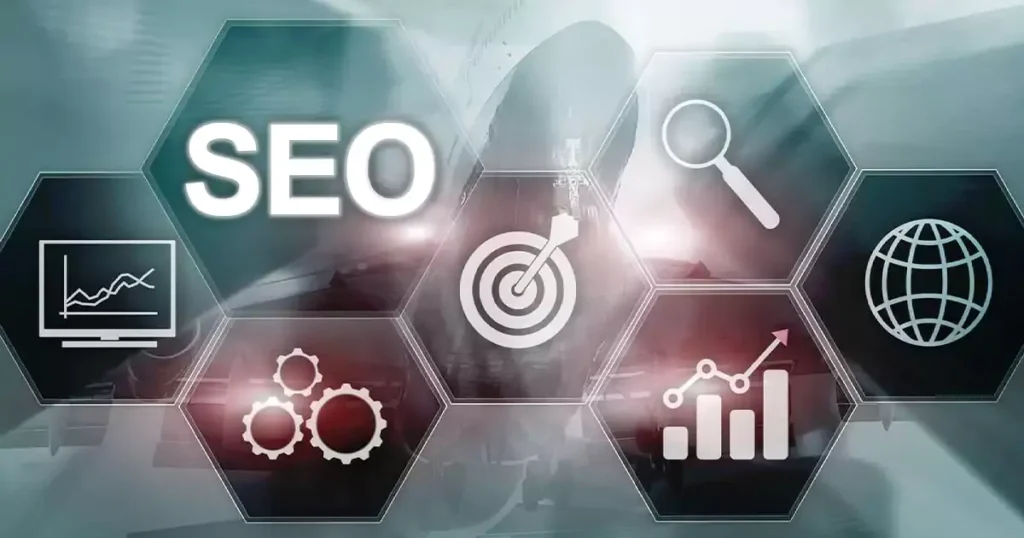Have you ever dived into the bustling streets of the online world and wondered how to stand out? It’s all about being seen, right?
But here’s the burning question: Should you invest time and energy in SEO or SEM? Or… is there even a difference?
Let’s unravel this digital conundrum together.

What is SEO?
Imagine your website as a shop in a vast digital mall. SEO, or Search Engine Optimization, is like placing your store at the most foot-trafficked intersection. It’s about naturally drawing visitors in.
In simple words, SEO (Search Engine Optimization) is optimizing a website to achieve higher organic (non-paid) search results rankings on search engines like Google, Bing, and Yahoo.
SEO focuses on enhancing the website’s quality and relevance to certain keywords, improving user experience, and building authority through quality backlinks.
The main components of SEO are:
- On-Page SEO: Refers to adjustments and improvements on the website, such as content quality, keyword optimization, meta tags, and more.
- Off-Page SEO: Focuses on actions taken outside the website, such as building backlinks from other reputable websites, social media efforts, and more.
- Technical SEO: Ensures the technical health of a website, such as improving site speed, ensuring mobile-friendliness, creating an XML sitemap, and optimizing site structure.

What is SEM?
And Then, There’s SEM… SEM, or Search Engine Marketing, is a bigger umbrella. Picture this: Apart from having an attractive store, you’ve hired someone to hand out fliers outside. That’s the paid advertising part.
SEM often involves platforms like Google Ads. You pay to play – getting your site’s ad up at the top of search results.
In other words, SEM (Search Engine Marketing) is a digital marketing strategy that increases a website’s visibility on search engine results pages (SERPs) primarily through paid advertising.
This usually involves platforms like Google Ads and Bing Ads, where advertisers bid on keywords that users might type into search engines when looking for their products or services.
When these keywords are queried, the advertiser’s ad might appear above or alongside organic search results, making the website more visible to potential visitors.
So, What Sets Them Apart?
- Nature
SEO is like the organic veggies at a market – grown without artificial help. SEM, on the other hand, is supercharged with some paid boosters.
- Cost
While SEO feels ‘free,’ it isn’t entirely. You’re not paying for clicks, but you’re nurturing your site. SEM is straightforward – each click has a price tag.
- Time Frame
SEO is a slow cooker recipe; let it simmer, and the flavours deepen over time. SEM? It’s your microwave fix – fast and immediate.
- Positioning on SERP
Ever noticed the “Ad” sign on some search results? Those are SEM’s territory. SEO stakes its claim below these.
- Targeting
SEO is like casting a net based on the relevance of your content. SEM? It’s more like a fishing line, where you decide which fish (read: audience) you want to catch.
Pros And Cons
- SEO
Good News: Long-lasting traffic, a sense of trust, and it can be budget-friendly in the long run.
Not-so-Good News: Waiting for results can feel like watching paint dry. Plus, the rules of the game (ahem, algorithms) change.
- SEM
High-Fives: Immediate results and ninja-level targeting. You’re in the driver’s seat, controlling your budget.
Oopsies: Your visibility can disappear faster than a pizza at a party if you stop funding ads. Plus, some users have developed ad blindness.
Wrapping Up…
So, are SEO and SEM two sides of the same coin? Or two different coins altogether? Well, it’s a bit of both. While both aim to boost your online presence, they have different paths. Which path is for you? Maybe both?
Have you ever tried balancing both SEO and SEM for your site? Drop in your experiences below. We’d love to hear your story!
And just like that, you’re now equipped with the basics of SEO and SEM. The digital world awaits, my friend. Dive in and make a splash!

Why is it Important?
Both SEO and SEM play crucial roles in a digital marketing strategy, and here’s why they’re important:
- Visibility & Brand Awareness: With billions of searches conducted daily, appearing on the first page of search results (either organically through SEO or via paid ads with SEM) helps brands become more noticeable and recognized by potential customers.
- Credibility & Trust: Websites that rank high organically are often perceived as trustworthy and authoritative in their fields. SEO helps in achieving this credibility.
- Targeted Traffic: SEO and SEM allow businesses to target specific audiences based on their search queries, ensuring that the traffic coming to the website is relevant and more likely to convert.
- Cost-Effective Marketing: While SEM involves costs per click, it can offer immediate visibility and ROI. Conversely, SEO requires an initial investment of time and resources but can lead to sustained organic traffic in the long run without recurring ad spend.
- Competitive Advantage: With most businesses now online, having a robust SEO and SEM strategy can give companies a significant edge over competitors who are not as visible on search engines.
In essence, SEO and SEM are indispensable tools in the modern digital age, helping businesses reach their target audiences, drive traffic, and achieve their growth objectives.
Verdict
As the digital landscape evolves, understanding the intricate dynamics of SEO and SEM becomes paramount for businesses.
Whether achieving long-term organic growth through SEO or seeking immediate visibility via SEM, both strategies have unique strengths and applications.
To make the most of your online presence, it’s vital to appreciate the differences, synergies, and value that both SEO and SEM bring.
Neither is categorically “better”; it depends on your business goals. If you want immediate visibility and have a budget, SEM might be your choice. For long-term, sustainable growth, SEO is essential. Most businesses benefit from a combination of both.
SEO focuses on organic search results and involves optimizing your website to rank higher in these results. On the other hand, SEM centers on paid advertising to boost visibility on search engines.
An SEO specialist primarily works on optimizing website content, structure, and backlinks to improve organic search rankings.
An SEM specialist focuses on creating and optimizing paid advertising campaigns on search platforms like Google Ads or Bing Ads.
Using both allows businesses to gain immediate visibility (through SEM) while building a foundation for long-term organic growth (through SEO).
This multi-pronged approach ensures both short-term and long-term online visibility.
SEM offers immediate visibility, precise audience targeting, flexibility in budget and strategy, measurable ROI, and prominence on the search results page (ads often appear above organic results).
People use SEM for quick visibility, especially when launching new products, targeting specific demographics, or capitalizing on timely promotions. It’s also used when entering competitive markets where organic ranking may take time.
SEM can be more expensive in the short run since you pay for each click. SEO requires an initial investment in content creation, optimization, and other factors but doesn’t have ongoing costs per user acquisition.
Over time, SEM might accumulate higher costs, especially in highly competitive industries.
Both have their complexities. SEO requires patience and a deep understanding of algorithms and best practices. SEM demands a grasp of budget allocation, ad creation, and campaign optimization. With the right expertise or guidance, both can be managed effectively.
An SEM marketer designs implements and optimizes paid advertising campaigns on search engines. They determine the right keywords, set budgets, create compelling ad copies, analyze campaign performance, and adjust strategies to maximize ROI.